Introduction
Alcohol cravings can be a significant challenge for those recovering from alcohol use disorder (AUD). These cravings are driven by a complex interplay of neurobiological, psychological, and environmental factors. Understanding how to manage and alleviate these cravings is essential to sustaining long-term recovery. In this article, we’ll explore a range of strategies and insights into what can help with alcohol cravings, from dietary recommendations and coping mechanisms to pharmacological options and lifestyle changes.
Dietary Recommendations for Reducing Cravings
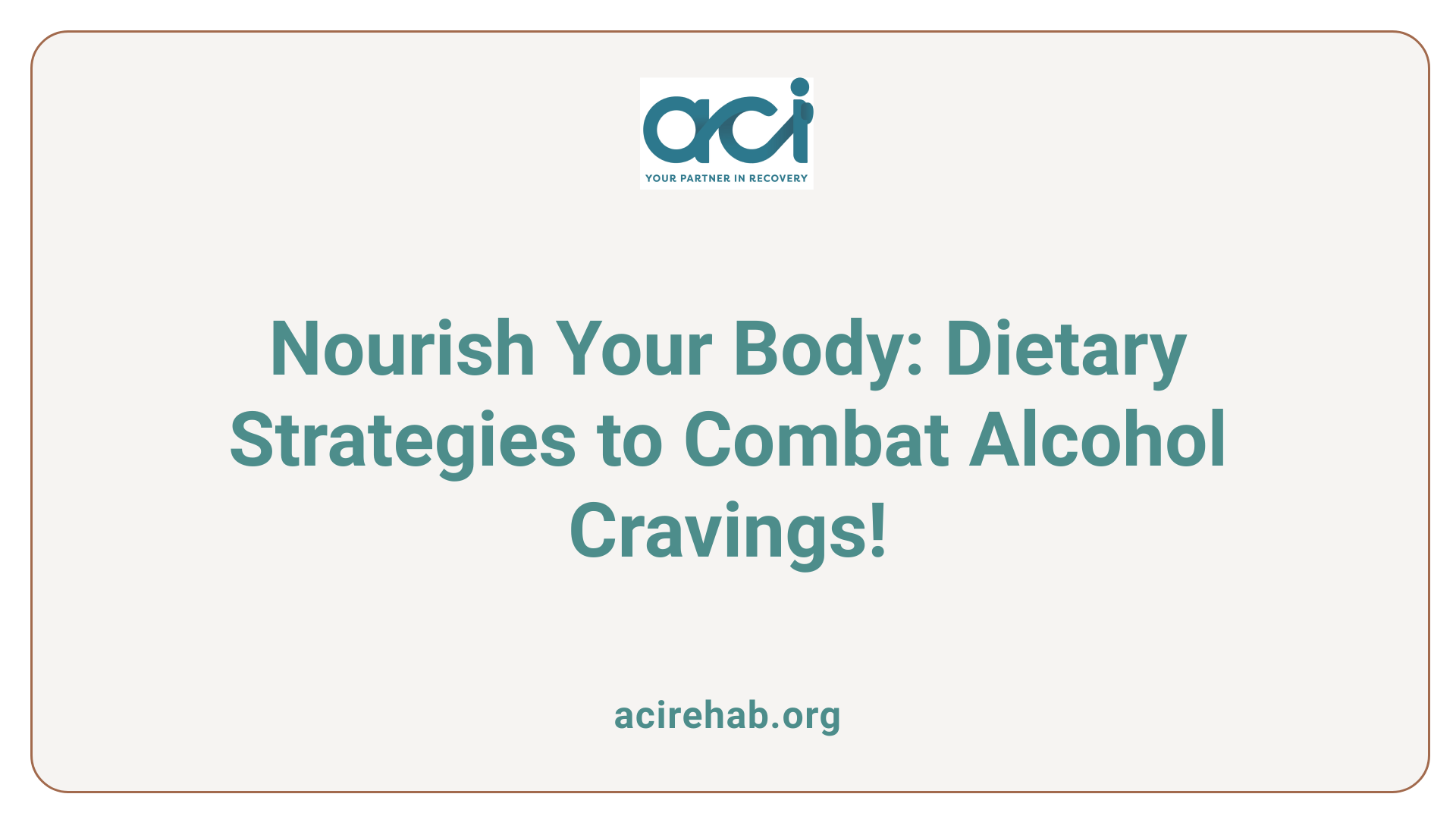
What dietary recommendations can help reduce alcohol cravings during recovery?
Dietary recommendations that can help reduce alcohol cravings during recovery include maintaining a balanced diet rich in proteins, complex carbohydrates, and healthy fats. Incorporating foods high in vitamins and minerals, such as B vitamins, can support mood stability and brain function, which is essential for recovery.
Nutritional impact on recovery
Regular consumption of whole grains, fruits, and vegetables provides the necessary nutrients to stabilize blood sugar levels and aid in detoxification. Foods like bananas, avocados, and chickpeas are rich in vitamin B6, which may help regulate mood and neurotransmitter production, potentially lowering cravings.
Staying hydrated and eating three meals a day can help manage hunger and reduce cravings. Additionally, avoiding refined sugars and excessive caffeine can help maintain energy levels and prevent mood swings during the recovery process.
A few specific dietary strategies that may be beneficial:
- Omega-3 Fatty Acids: Found in salmon and walnuts, they support brain health.
- High-Protein Foods: Such as lean meats and legumes, help stabilize blood sugar.
- Complex Carbohydrates: Like oats and quinoa, provide sustained energy.
Adopting these nutritional strategies may create a supportive environment for recovery by reducing the intensity and frequency of alcohol cravings.
Coping Mechanisms for Managing Cravings
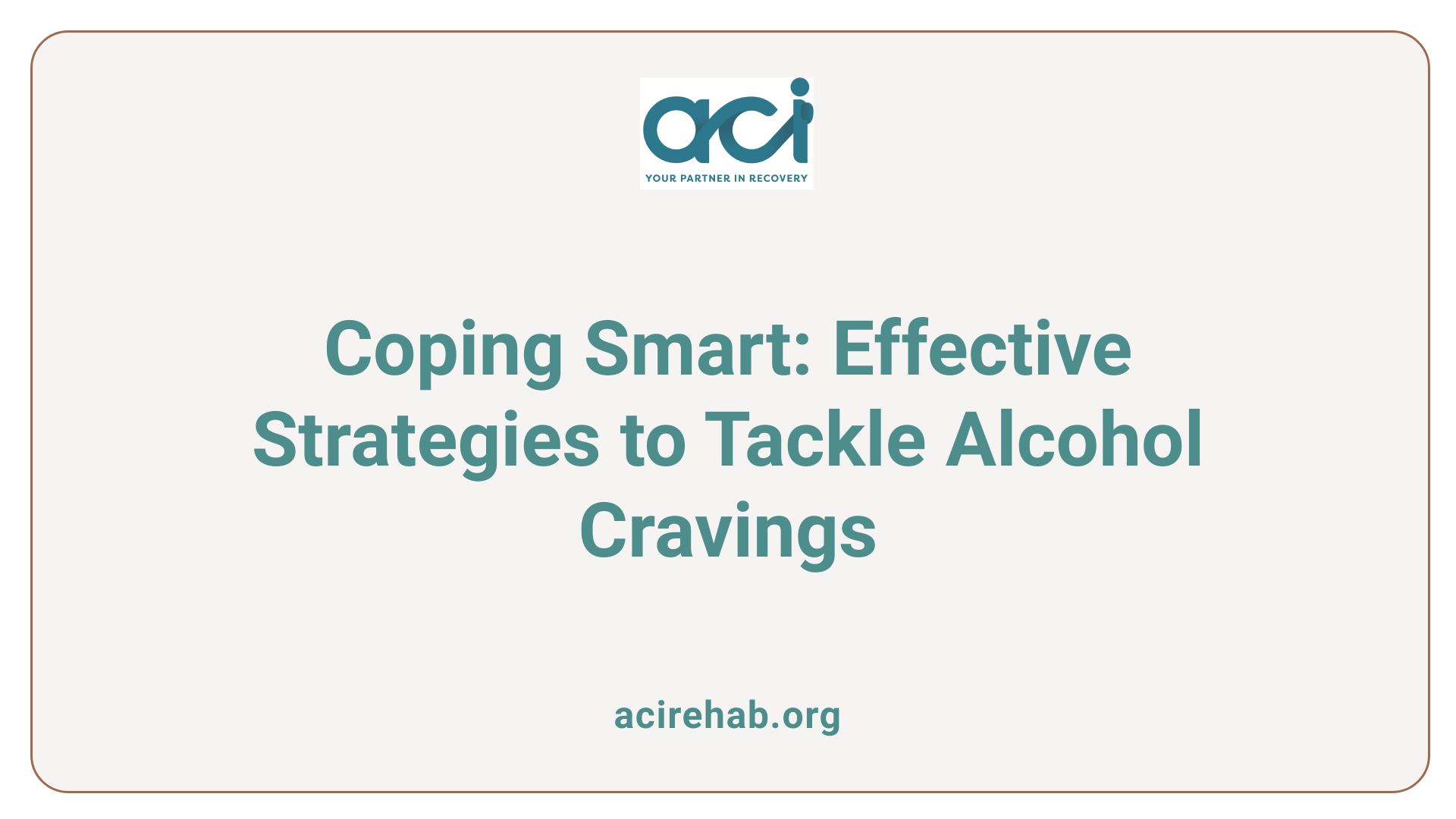
Which coping mechanisms are effective for handling alcohol cravings?
Effective coping mechanisms for handling alcohol cravings involve a combination of awareness and proactive strategies. Recognizing that cravings are temporary and that they will pass is crucial. Accepting this reality can significantly lessen their control over one’s behavior.
Avoiding Triggers: One of the most effective strategies is to avoid known triggers. This involves steering clear of situations or environments that stimulate the desire to drink, such as bars or social gatherings where alcohol is present.
Distraction Techniques: Engaging in hobbies, listening to music, or going for a walk can serve as healthy distractions during cravings. Keeping busy and occupied reduces the focus on the urge to drink.
Cognitive Behavioral Approaches: Techniques from cognitive behavioral therapy can be beneficial. Challenging the thoughts that lead to cravings and reinforcing personal motivations for staying sober can change how one responds to urges. This often includes creating a plan for social situations where alcohol may be tempting, providing a verbal script or strategy for politely declining drinks.
Community Support: Involving supportive friends or joining recovery groups can add a layer of emotional support. Discussing cravings with others who understand can provide encouragement and strength in resisting urges.
Tracking and Planning: Utilizing tools like tracking forms or coping strategy planners can empower individuals. By identifying personal triggers and developing tailored strategies, people can take proactive steps to manage their cravings effectively.
Understanding Triggers and Neurobiology
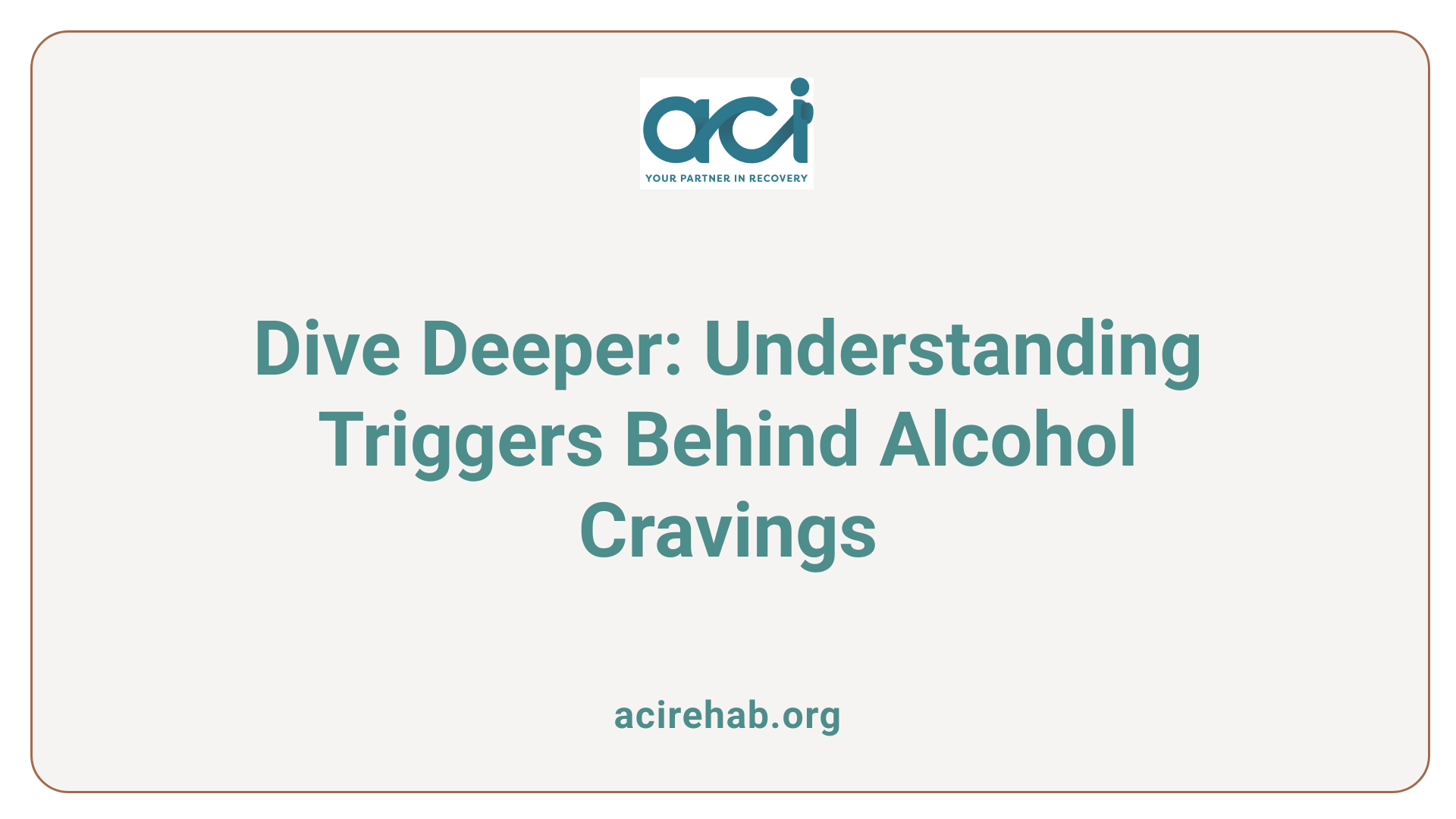
What triggers alcohol cravings and what is their neurobiological basis?
Alcohol cravings arise mainly due to a combination of environmental cues, emotional states, and physiological responses associated with drinking. Common triggers include stress-inducing situations, specific places linked to past drinking experiences, and intense emotions such as anxiety or sadness. These feelings activate neural pathways related to reward and motivation, particularly in an area of the brain known as the nucleus accumbens.
The neurobiological response involves a surge in dopamine signaling, which reinforces the desire for alcohol as a means of achieving pleasure or relief. Chronic consumption leads to significant changes in brain chemistry, resulting in neuroadaptations that shift motivation from pleasure-driven behavior to relief-seeking actions, often directed towards alleviating withdrawal symptoms.
Psychological and Physiological Interplay
Internal factors, like increased irritability and anxiety during withdrawal, can heighten alcohol cravings significantly. This phenomenon, called hyperkatifeia, underscores the struggle between the emotional discomfort of withdrawal and the impulse to consume alcohol for relief.
Understanding this intricate relationship between psychological triggers and physiological reactions helps pave the way for more effective coping strategies, such as mindfulness practices, behavioral therapy, and medication-assisted treatments. By addressing both the psychological and physiological aspects of cravings, individuals can attain a better grasp of their addiction while fostering healthier coping mechanisms.
Pharmacological Options for Managing Cravings
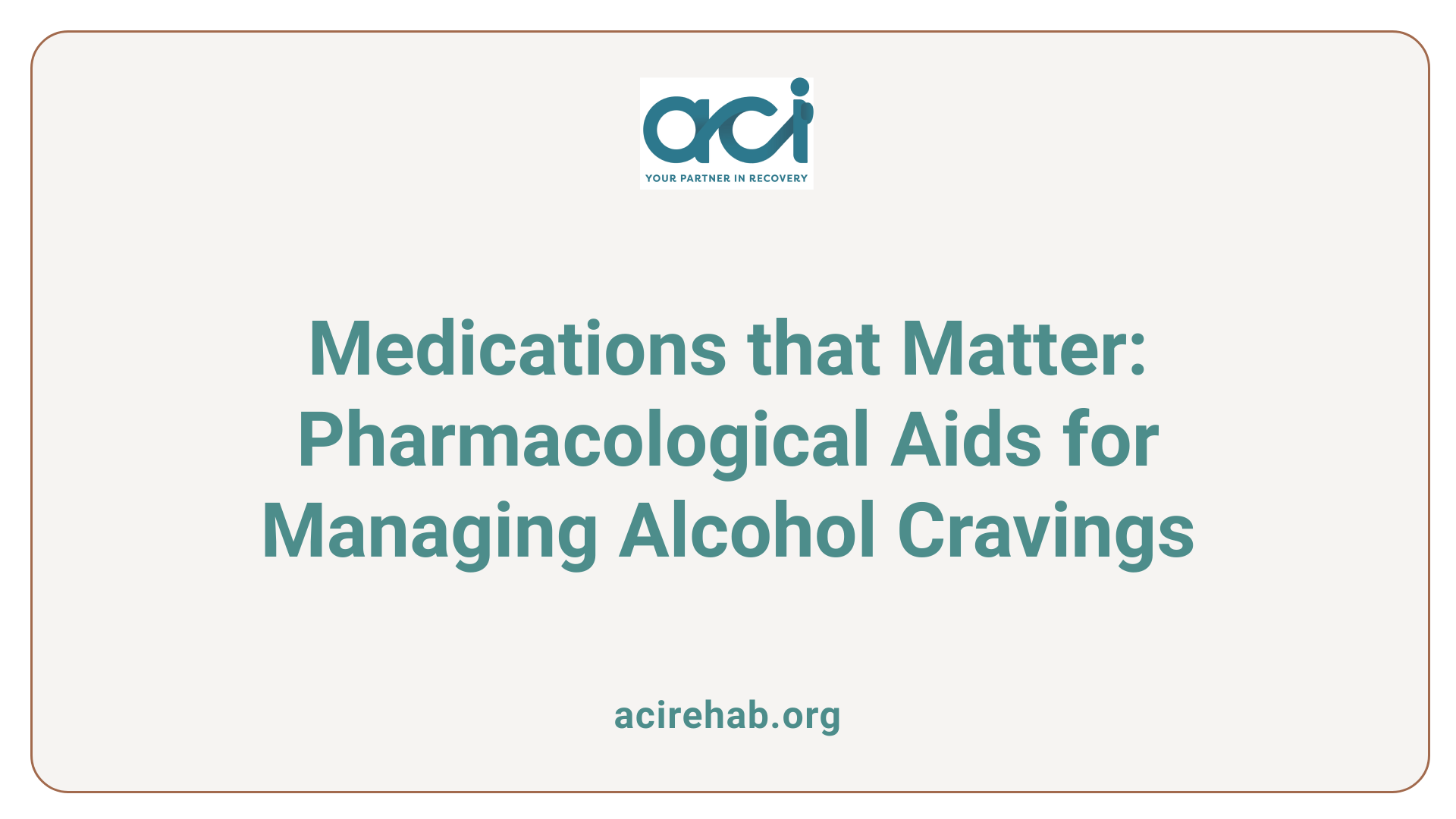
Are there medications that can assist in managing alcohol cravings?
Yes, there are several medications that can assist in managing alcohol cravings, including:
-
Naltrexone: This medication blocks opioid receptors in the brain, decreasing the pleasurable sensations associated with alcohol consumption. It’s effective in reducing cravings and is typically taken once daily. Research supports its use for individuals with mild to moderate alcohol use disorder.
-
Acamprosate: Known by the brand name Campral, acamprosate helps restore the chemical balance disrupted by prolonged alcohol use, helping to alleviate withdrawal discomfort. It may be taken three times a day after achieving abstinence and can help prevent relapse.
-
Disulfiram: Often sold under the name Antabuse, disulfiram works differently by causing unpleasant reactions when alcohol is consumed. Although it does not directly alleviate cravings, it serves as a deterrent against drinking.
Topiramate and gabapentin are also notable, as they show promise in reducing drinking behaviors but are not yet FDA-approved for treating alcohol use disorder. The choice of medication often hinges on personal preferences and medical history, highlighting the importance of personalized treatment approaches.
How do these medications work?
- Naltrexone reduces the rewarding effects of alcohol, leading to decreased cravings.
- Acamprosate focuses on normalizing neurotransmitter activity disrupted by alcohol.
- Disulfiram provides a negative consequence for drinking, thus encouraging abstinence.
Consulting a healthcare provider can guide the selection of the best medication tailored to individual needs.
Natural Remedies and Lifestyle Adjustments
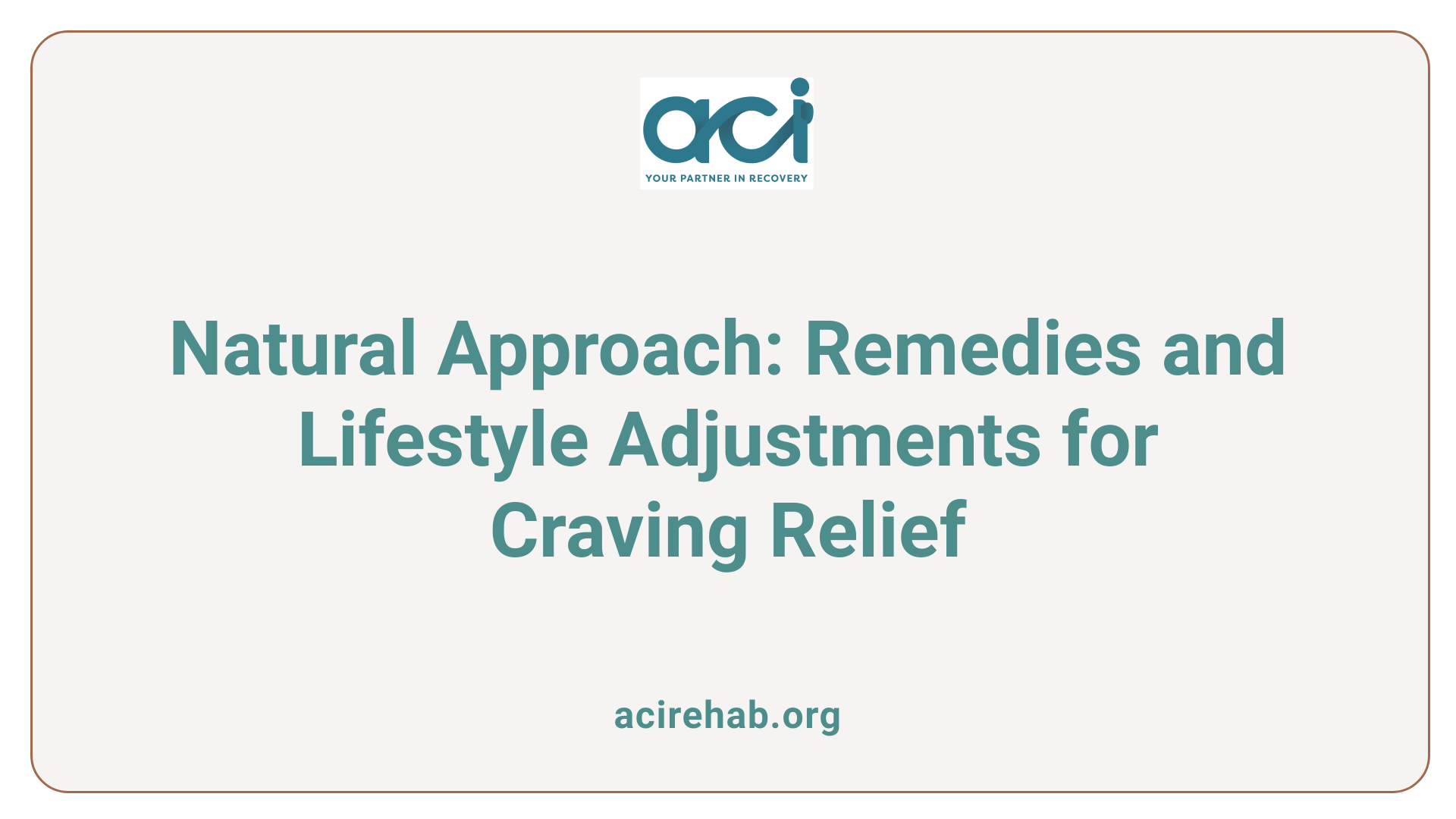
What natural remedies and lifestyle changes help alleviate alcohol cravings?
Natural remedies and lifestyle changes play a vital role in managing alcohol cravings. A nutritious diet is the cornerstone of this approach. Foods rich in complex carbohydrates, lean proteins, and essential vitamins—particularly vitamin B6 and omega-3 fatty acids—can stabilize mood and energy levels, thus reducing cravings. For example:
- Lean Proteins: Sources like chicken, fish, and legumes provided necessary amino acids for neurotransmitter production.
- Complex Carbohydrates: Incorporating whole grains such as quinoa and oats can help maintain steady blood sugar levels, preventing the spikes that often trigger cravings.
- Antioxidant-rich Foods: Fruits and vegetables, particularly berries and oranges, support brain health, possibly alleviating cravings through improved mood.
Regular physical activity also significantly contributes to overall well-being. Exercise reduces stress and can distract from cravings. Additionally, sufficient sleep is crucial as it helps regulate mood and energy, further diminishing the potential for cravings.
Mindfulness techniques like meditation and deep breathing can decrease emotional triggers associated with cravings. Engaging in support groups, such as Alcoholics Anonymous, fosters peer support and shared experiences, which can be incredibly encouraging during challenging times.
Certain herbal supplements are believed to aid in controlling cravings. Kudzu extract, for instance, has shown promise in reducing alcohol intake, while ashwagandha may help relieve withdrawal symptoms and stress. However, it’s essential to consult a healthcare provider before using these supplements to ensure safety and effectiveness.
Healthy distractions, such as listening to music or taking a walk, redirect focus from cravings and encourage positive behavioral patterns.
Incorporating these remedies and lifestyle changes can significantly enhance the ability to manage alcohol cravings and support recovery efforts in a holistic manner.
Role of Supplements in Craving Reduction
What role do supplements play in reducing alcohol cravings?
Supplements can significantly reduce alcohol cravings by addressing common nutritional deficiencies found in individuals with alcohol use disorder (AUD). Many people struggling with alcohol dependency have low levels of B vitamins, magnesium, and omega-3 fatty acids, all of which are crucial for maintaining balanced brain chemistry and good mental health.
Specific supplements can offer targeted support. For example, N-acetylcysteine (NAC) has been shown to help regulate neurotransmitter levels and replenish antioxidants, potentially diminishing cravings. GABA supplements may also aid in reducing anxiety linked to withdrawal, which can trigger cravings.
Vitamins like C and E support liver health and overall body function, further assisting in alleviating cravings that are often associated with detoxification.
Nutritional support
Incorporating a balanced diet rich in essential nutrients alongside these supplements is vital. Foods abundant in omega-3 fatty acids, such as salmon, walnuts, and flaxseeds, help support cognitive function and reduce inflammation. Likewise, high-protein foods can stabilize blood sugar, which plays a crucial role in regulating mood and cravings.
In summary, a combined approach of dietary adjustments and strategic supplementation can enhance recovery efforts and bolster overall well-being during the treatment of alcohol cravings.
Recognizing and Addressing Alcohol Cravings Effectively
How can I recognize and effectively address alcohol cravings?
Recognizing alcohol cravings is vital for effective management. These cravings can stem from internal triggers such as negative emotions, stress, or memories associated with drinking, and external triggers, including social situations or environments linked to past drinking. Cravings are often fleeting, typically lasting around 15-20 minutes, making them manageable with prompt action.
To effectively address cravings, consider the ‘recognize-avoid-cope’ approach:
- Recognize the craving when it arises.
- Avoid your known triggers and temptations in your environment, such as bars or parties.
- Cope using strategies like mindfulness meditation, physical distractions like going for a walk, or reaching out to supportive friends.
It can also help to keep minimal or no alcohol at home, and prepare a list of engaging activities that can be done during temptation times. For those who require additional assistance, medications such as naltrexone can reduce cravings and are worth discussing with a healthcare provider. Resources like SAMHSA’s National Helpline are also available for individuals seeking professional support to enhance their recovery journey.
Incorporating proper nutrition, staying hydrated, and maintaining a routine supportive of overall well-being can further bolster your ability to resist cravings and achieve long-term sobriety.
Scientific Insights on Craving Management Methods
What scientific insights are available on effective methods for managing alcohol cravings?
Effective management of alcohol cravings involves an integrated approach combining behavioral therapies and FDA-approved medications. Behavioral treatments like Cognitive-Behavioral Therapy (CBT) and Motivational Enhancement Therapy are essential for helping individuals identify their personal triggers and develop adaptive skills to cope with cravings.
Medications at a Glance
| Medication | Mechanism of Action | Key Role in Treatment |
|---|---|---|
| Naltrexone | Blocks opioid receptors, reducing pleasure derived from alcohol | Reduces cravings and the likelihood of relapse |
| Acamprosate | Restores chemical balance in the brain affected by alcohol use | Supports recovery by stabilizing brain functions |
| Disulfiram | Causes adverse reactions when alcohol is consumed | Discourages drinking by creating negative reinforcement |
These medications play a crucial role in treatment. For example, Naltrexone not only curtails cravings but also diminishes the pleasurable effects of drinking, making it easier for individuals to resist temptation. Acamprosate helps maintain stability in brain chemistry after sobriety has begun.
In addition to medication, support groups—such as Alcoholics Anonymous and SMART Recovery—provide emotional and social support, enhancing motivation and recovery outcomes. Mindfulness practices, regular exercise, and engaging in healthy distractions can also effectively lower the intensity of cravings, assisting individuals in their journey toward sustained sobriety.
Recognizing Triggers and Developing Coping Skills
Recognizing Triggers
Managing alcohol cravings begins with recognizing the triggers that provoke these urges. Triggers can be classified into internal and external categories. Internal triggers often stem from emotional states such as stress, anxiety, or depression, which may intensify the desire to drink. On the other hand, external triggers could be situations, places, or even social cues that remind an individual of past drinking behaviors. For example, visiting a bar where one frequently drank can elicit powerful cravings.
Developing Skills to Cope
Once triggers are identified, individuals can develop effective coping skills to manage their cravings. Some strategies include:
- Mindfulness and Meditation: Techniques that promote awareness of thoughts and sensations can help individuals ride out cravings.
- Engaging in Distractions: Activities like walking, listening to music, or calling a friend can divert attention from cravings.
- Utilizing Support Networks: Connecting with groups or talking to trusted friends about urges can provide emotional backing and reduce the feeling of isolation.
- Avoiding Triggers: Staying away from environments that evoke cravings is crucial to maintaining sobriety.
- Challenging Negative Thoughts: Cognitive-behavioral strategies can be employed to reshape thought patterns related to drinking.
Mastering these skills can significantly diminish the power of cravings, making it easier for individuals to maintain their recovery journey.
Conclusion
Alcohol cravings present a multifaceted challenge requiring a comprehensive approach for effective management. By combining dietary adjustments, pharmacological aids, behavioral techniques, and lifestyle modifications, individuals can successfully navigate the journey of recovery. Ongoing support from healthcare professionals, support groups, and family can further enhance efforts to overcome cravings and build a healthier, more resilient life. Remember that each pathway to recovery is unique, and finding the right balance of strategies tailored to personal circumstances is key to sustained sobriety and well-being.
References
- 7 Foods That Can Help Stop Alcohol Cravings
- Curb Alcohol Cravings: 3 Medications and 5 Natural Remedies
- How to Stop Alcohol Cravings – Handling the Urges to Drink
- Medications and Alcohol Craving – PMC
- Ways to stop alcohol cravings – Priory Group
- Looking to cut back on wine and beer? This pill might help
- Treatment – Alcohol misuse. – NHS

